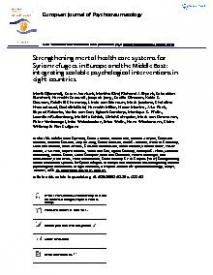Strengthening mental health care systems for Syrian refugees in Europe and the Middle East : integrating scalable psychological interventions in eight countries
The crisis in Syria has resulted in vast numbers of refugees seeking asylum in Syria’s neighbouring countries as well as in Europe. Refugees are at considerable risk of developing common mental disorders, including depression, anxiety, and posttraumatic stress disorder (PTSD). Most refugees do not have access to mental health services for these problems because of multiple barriers in national and refugee specific health systems, including limited availability of mental health professionals. To counter some of challenges arising from limited mental health system capacity the World Health Organization (WHO) has developed a range of scalable psychological interventions aimed at reducing psychological distress and improving functioning in people living in communities affected by adversity. These interventions, including Problem Management Plus (PM+) and its variants, are intended to be delivered through individual or group face-to-face or smartphone formats by lay, non-professional people who have not received specialized mental health training.
We provide an evidence-based rationale for the use of the scalable PM+ oriented programmes being adapted for Syrian refugees and provide information on the newly launched STRENGTHS programme for adapting, testing and scaling up of PM+ in various modalities in both neighbouring and European countries hosting Syrian refugees.
In: European journal of psychotraumatology, ISSN 2000-8198, eISSN 2000-8066 | 8 | sup2 | November | 1-11
http://doi.org/10.1080/20008198.2017.1388102
Themanummer, Vol. 8, 2017 - Issue sup2: Traumatized Refugees


